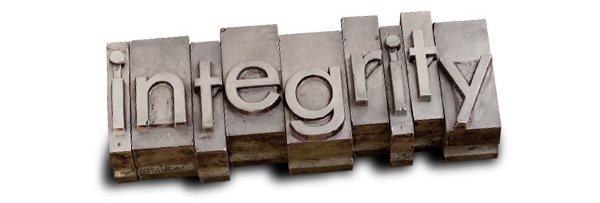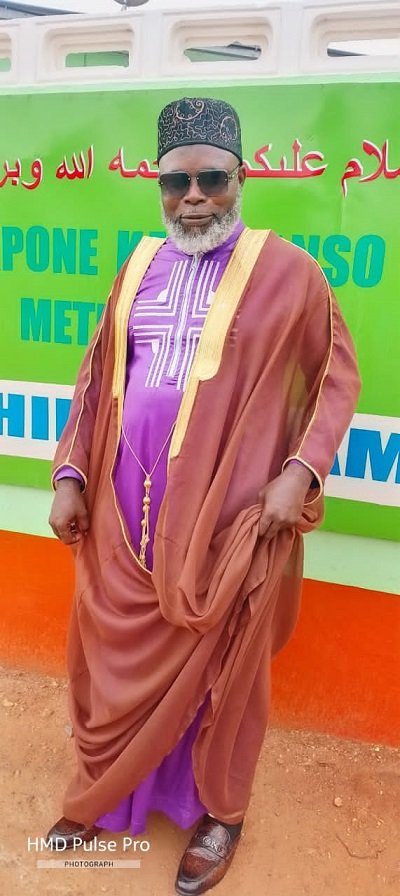Fruitful Living
Integrity in daily living

LORD, who may abide in Your tabernacle? Who may dwell in Your holy hill? He who walks uprightly, and works righteousness, and speaks the truth in his heart; He who does not backbite with his tongue; Nor does evil to his neighbour, nor does he take up a reproach against his friend; in whose eyes a vile person is despised. But he honours those who fear the Lord; He who swears to his own hurt and does not change; He who does not put out his money at usury, nor does he take a bribe against the innocent. He who does these things shall never be moved – Psalm 15 (New King James).
INTRODUCTION
Although we often hear this word integrity in personal and professional contexts, its meaning can be tricky to sum up. So here is a practical definition and some helpful examples of integrity in action. The convictions of a person of integrity determine what they will say and do at any given time. They intentionally direct their conduct according to their understanding of what is right and wrong. Authenticity marks the heart of integrity. Their internal character remains consistent regardless of external conditions.
Integrity includes the quality of being honest, but honesty does not always demonstrate integrity. The difference is the inner commitment to being trustworthy and communicating the truth without deception. An integrated person lives without duplicity and hypocrisy.
A person of integrity does not claim to be perfect. Instead, they are quick to acknowledge their own mistakes and faults. Their sincerity comes from a pure motivation to do what is right even when it might be inconvenient. Times of crisis particularly test a person’s integrity. What would it take for you to compromise your resolve to do what you believe is right?
Psalm 15 has several criteria for assessing our character. Significantly, almost all the marks of integrity listed in Psalm 15 relate to workplace issues. The qualities mentioned in the same Psalm extend to personal issues of integrity and honesty, our relationships with others and the way we handle our money. Our worship of God should not only be in terms of our inward, personal needs but also in light of our outward, public responsibilities. After all religion is a matter of character as well as conduct. Our walk must match our talk.
INVENTORY OF INTEGRITY
A person of Integrity is someone who:
1. WALKS UPRIGHTLY: – someone whose character is above reproach.
What about you? What is your basic ethical commitment? Are you out to honour the Lord or to serve yourself?
2. WORKS RIGHTEOUSNESS: – someone who does what is right all the time.
What is the end result of your work? Is your work self-serving or do you work to promote good in the nation? Do you make your light shine where you have been put in spite of difficulties and challenges or are you the complaining type, never satisfied with what you are being given?
3. TELLS THE TRUTH: – someone for whom truth-telling is second-nature.
Are you in the habit of telling lies – what you consider to be “little white lies” when it is necessary or convenient? Or do you tell the truth even when doing so is costly.
4. DOES NOT BACKBITE: – someone who does not slander others.
Do you tear down others behind their backs? Are you one of those who think that they can progress by destroying, tearing down others? Verbal murder is as serious as physical murder.
5. DOES NO EVIL TO A NEIGHBOUR: – someone who does not deliberately work against his colleagues
What is your policy on office politics? Do you do unto others what you would like done to you? Or do you believe in “doing unto others before they do unto you”?
6. DOES NOT TAKE UP A REPROACH AGAINST A FRIEND: – someone who stands by those he claims to be friends with.
What is the level of your loyalty? When people collude to bring down a colleague (even when the person has done no wrong) do you jump on the bandwagon? Or do you seek fair play and offer support to the one who is being unjustly treated.
7. HONOURS THOSE WHO FEAR THE LORD NOT THE UNGODLY: – someone who takes faith in the Lord seriously and shuns ungodly company.
What is the character of your best friends? What is their attitude towards God and the things of the Lord? Do people know your godliness by the type of friends you have?
8. KEEPS HIS WORD EVEN IF IT IS COSTLY: – someone who keeps his promise whatever the cost.
Do your family and friends consider you trustworthy and reliable? Do you keep your word? Are you known as one whose word is his bond? Or do people always wonder whether you will follow through on your promises?
9. DOES NOT PRACTISE USURY: – someone who does not take advantage of those who require their help
Do you make it harder or easier for those in need to gain the resources necessary to support themselves? Or do you take advantage of the poor and to make more profits?
10. DOES NOT TAKE BRIBES: – someone who does not demand money to do the work for which he is paid.
Is it said of you that under no circumstances will you compromise yourself by taking bribes? Can people confidently say of you that you will never take bribes? Or do you accept kickbacks because everybody does it?
SELF ANALYSIS
How do you stand in the light of this integrity inventory? It is said that reputation is what you do when everybody is watching; character is what you do when no one is watching. Do people perceive you as one who has a reputation for integrity when in truth it is all a façade because behind the scenes you are always compromising? Daniel was different. We read in Daniel 1:8: But Daniel resolved not to defile himself with the royal food and wine, and he asked the chief official for permission not to defile himself this way. Daniel and his three friends made up their minds to stand for godly values even though they lived in the midst of very ungodly they took a stand not to defile themselves.
RESOLVE TO DO THE RIGHT
This is the time in our nation’s history when we all need to reveal our true character. As people of God we have great opportunity to influence those around us through our ethics and morality in our workplaces. We must refuse to go along with what everybody is doing. That is the real challenge of workplace ethics. Occasionally we may struggle to discern the right from the wrong but most of the time, we will have to summon the conviction and the courage to do what we know is right. In the final analysis the truth we know in our hearts – the truth based on Biblical principles – is what we need to do or not do. Like Daniel and his friends we can settle in our hearts to do what is right and carry out our plans with tough-minded resolve.
As we face ethical choices in our workplaces, we can choose to stand for the right. It may be costly, but God will give us the strength to handle whatever consequences come our way. Scripture never encourages us to close our eyes to wrongdoing. Instead we are to “hate what is wrong and stand on the side of the good” – Rom. 12:9(New Living Translation). This may involve speaking out publicly about hidden wrongs with which we are familiar. We need not be afraid in such circumstances for it is better to pursue justice even if it means “blowing the whistle” on some people.
May our Lord Jesus Christ Himself and God our Father, who loved us and by His grace gave us eternal encouragement and good hope, encourage your hearts and strengthen you in every good deed and word – 2 Thess. 2: 16-17.
Stay blessed!
For further inquiries please contact us on Tel Nos. 0302-772013 or 0268130615
Email: saltnlightministries@gmail.com
Website: saltandlightministriesgh.org
By Dr Joyce Aryee, the author
Fruitful Living
Eid-ul-Adha: A living legacy of faith, sacrifice, and devotion

We begin in the name of Allah, the Most Merciful, the Most Compassionate. We praise Him, seek His help and forgiveness, and seek refuge in Him from the evils of our souls and the wrongs of our actions.
May peace and blessings be upon the Prophet Muhammad (peace be upon him), his family, his noble companions, and all those who follow his path until the Day of Judgment.
Understanding the essence
of Eid-ul-Adha
Eid-ul-Adha, the Festival of Sacrifice, is one of the two major Islamic celebrations observed by Muslims across the world.
It commemorates the unwavering submission of Prophet Ibrahim (Abraham, peace be upon him) to Allah’s command when he was prepared to sacrifice his beloved son Isma’il (Ishmael, peace be upon him). Allah, in His infinite mercy, intervened and replaced the son with a ram, thus honouring Ibrahim’s sincerity and faith.
This moment of sacrifice is recorded in the Qur’an: “Then when they had both submitted and he put him down upon his forehead, We called out: ‘O Ibrahim! You have fulfilled the vision.’ Indeed, We thus reward the doers of good.” (Surah As-Saffat, 37:103–105)
This act of obedience is not merely a historical account. It is a living symbol that forms the essence of Eid-ul-Adha.
Ibrahim (A.S): The Architect
of Submission
Before the moment of sacrifice, Prophet Ibrahim and his family played critical roles in establishing Islam’s foundational pillars:
1. The building of the Ka‘bah
Prophet Ibrahim and his son Isma’il were chosen to construct the Ka‘bah, the sacred House of Allah in Makkah. The Qur’an records this noble moment:
“And [mention] when Ibrahim was raising the foundations of the House and [with him] Isma’il, [saying], ‘Our Lord, accept [this] from us. Indeed, You are the Hearing, the Knowing.’”
(Surah Al-Baqarah 2:127)
This structure remains the spiritual centre of Muslim worship, facing which over a billion Muslims direct their daily prayers.
2. The struggle of Hajar (Hajara) between Safa and Marwa
The mother of Isma’il, Hajar (Hajara), exemplifies a profound lesson of patience and faith. Left in the barren valley of Makkah with her infant, she ran between the hills of Safa and Marwa, desperately searching for water. Her perseverance was rewarded when the well of Zamzam sprang forth at the feet of her baby.
Her sincere struggle is now ritualised in Hajj as the Sa‘i between Safa and Marwa—a reminder of the role of women, the power of du‘a, and the value of trust in Allah’s provision.
Sacrifice at Mina and the
Rites of Jamarat
During Hajj, pilgrims reenact Ibrahim’s confrontation with Shaytan at Mina, where he rejected the devil’s temptation and cast stones at him. This act is now observed in Hajj as the ritual of stoning the Jamarat, symbolising the rejection of evil, temptation, and disobedience.
It is a vivid spiritual lesson: the path to Allah is one of resistance to distraction and sin, and one must be prepared to fight these forces with unwavering faith.
The essence of Arafat in Hajj
The Prophet Muhammad said:“Hajj is Arafah.” (Sunan al-Tirmidhi, 889)
Standing on the plain of Arafat, in deep humility and supplication, is the heart of Hajj. It represents the Day of Judgment, when all of humanity will stand before their Creator. The Prophet said: “There is no day on which Allah frees more people from the Fire than the Day of Arafah.” (Sahih Muslim, 1348)
For pilgrims, Arafat is a time of repentance, reflection, and renewal— and for non-pilgrims, fasting on that day is highly recommended.
Three core lessons from the
Sacrifice of Prophet Ibrahim
(A.S.)
1. Absolute obedience to Allah
Ibrahim’s willingness to sacrifice his son teaches that the essence of faith is unquestioning obedience to Allah. He prioritised divine command over emotion, logic, or comfort.
Takeaway:
In our lives, we must also be ready to put aside our desires, egos, and even attachments if they conflict with Allah’s instructions. This may involve sacrifices such as waking up for Fajr, staying away from haram income, or being truthful in difficult situations.
2. Sincere intention and inner sacrifice
The real essence of the sacrifice lies in the heart’s submission to Allah.
It is neither their meat nor their blood that reaches Allah, but it is your piety that reaches Him.”
(Surah Al-Hajj 22:37)
Takeaway:
Every act of worship should be grounded in sincerity. Whether it is prayer, charity, or sacrifice, what matters most is the purity of our intention.
3. Sacrifice for the greater good
The legacy of Eid-ul-Adha teaches us that sometimes, faith requires us to give up what we love for a greater purpose. Sacrificing wealth, time, or status in the path of Allah or for the benefit of others leads to spiritual elevation.
Takeaway:
Use your resources such as time, money, skills, for acts of benefit: support the poor, educate the young, assist the sick, and build your community.
Celebrating Eid-ul-Adha: A
Festival for all Muslims
Even for those who do not go on Hajj, Eid-ul-Adha holds immense significance. Muslims across the world participate in the act of Qurbani (sacrifice) to honor the tradition of Ibrahim (A.S.).
Types of animals and their
symbolism
Permissible animals include goats, sheep, cows, and camels. Each must meet a minimum age and be free of defects. The sacrificed animal is then divided into three parts: one for the family, one for relatives and friends, and one for the poor and needy.
This distribution reflects the spirit of sharing, compassion, and social responsibility—values at the heart of Islam.
The eternal message of Eid-ul-Adha
Eid-ul-Adha is not merely a celebration; it is a living tradition that calls us to:
• Submit like Ibrahim,
• Strive like Hajar,
• Sacrifice like Isma’il,
• Reflect like the pilgrims at Arafat.
May this Eid awaken within us a renewed commitment to obedience, sincerity, and compassion.
Let us make every Eid-ul-Adha a step forward in our spiritual journey, embodying the values of submission, sacrifice, and service to humanity. I wish every Muslim Eid Mubaarak
By Imaam Alhaji Saeed Abdulai
(Kpone Katamanso Metropolitan Chief Imaam)
Fruitful Living
Steps taken by government to combat illicit drugs (Final part)
The Minister for the Interior, Muntaka Mohammed-Mubarak, has reaffirmed the government’s commitment to combating drug abuse and illicit trafficking for a safer environment which would
go a long way to make Ghana a drug-free country. 3News.com (2025)
Solutions to Illicit Drugs from the Islamic perspective
are comprehensive and emphasise of both prevention and treatment:
Tarbiyah (Islamic nurturing): Instilling strong Islamic values from childhood through Qur’anic education, regular prayer, and association with righteous companions.
Community preaching (Da’wah): Imams must consistently raise awareness during khutbahs and Islamic programs about the dangers of drugs and the beauty of a sober, productive life.
Faith-based rehabilitation: Mosques and Islamic centers can partner with medical institutions to offer Qur’an therapy, spiritual counseling, and structured recovery programs.
Islamic youth clubs: Providing youth with halal entertainment, mentorship, and purposeful engagement can steer them away from harmful peer groups.
Zakat and Sadaqah: Channelling funds to support families of victims and establishing centres for rehabilitation.
Role of Parents, Society, Muslim Chiefs and Imams:
Parents must be vigilant and provide emotional support. A loving, nurturing home reduces a child’s vulnerability to drugs.
Society should de-stigmatize addiction. Drug users should be seen as patients needing healing, not criminals deserving rejection.
Muslim Chiefs must lead community campaigns, setting moral examples and supporting policy enforcement.
Imams must be more than religious leaders—they must become counsellors, educators, and advocates. Their leadership can shift public perception and guide collective action.
Conclusion
Illicit drugs pose one of the most dangerous threats to our society, undermining our religious values, harming our youth, and destroying our future. The Islamic position is clear and
Unequivocal: such substances are forbidden due to their destructive consequences on all aspects of life. Islam does not merely condemn the act but calls for a holistic response—spiritual, social, and structural.
As a society, particularly as Muslims, we must rise to confront this crisis with faith, compassion, and commitment. We must not only preach against drugs but actively work to rehabilitate victims, educate the next generation, and partner with public institutions to create a society of wellness and righteousness.
Recommendations
1. Introduce Islamic drug awareness education in madrasas and public schools, using Quran and Hadith-based materials to instill moral responsibility.
2. Create partnerships between the Ghana Narcotics Control Commission, Ghana Health Service, and Muslim organisations to develop culturally sensitive rehabilitation centres.
3. Train Imams and teachers in basic mental health and drug abuse counselling to serve as front-line responders in communities.
4. Utilise Friday sermons (khutbahs) nationwide to address the dangers of drug abuse periodically and provide practical steps for prevention.
5. Encourage community surveillance, where parents, chiefs, and youth groups report dealers and suspicious activities to the authorities.
6. Establish mentorship programmes in every Muslim community where successful, drug-free role models mentor youth.
7. Form interfaith coalitions, working across religious lines to tackle the drug menace as a national threat rather than a religious issue.
8. Provide job skills training for rehabilitated victims, helping them reintegrate into society and live dignified, self-sufficient lives.
By Imam Alhaji Saeed Abdulai, the Author







